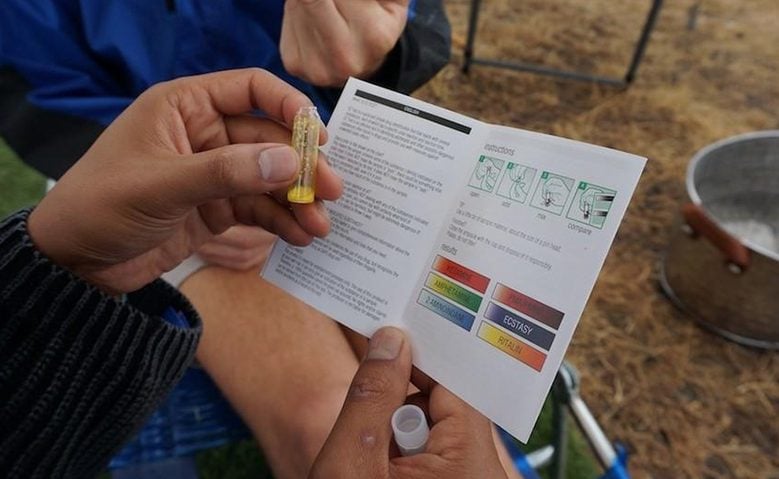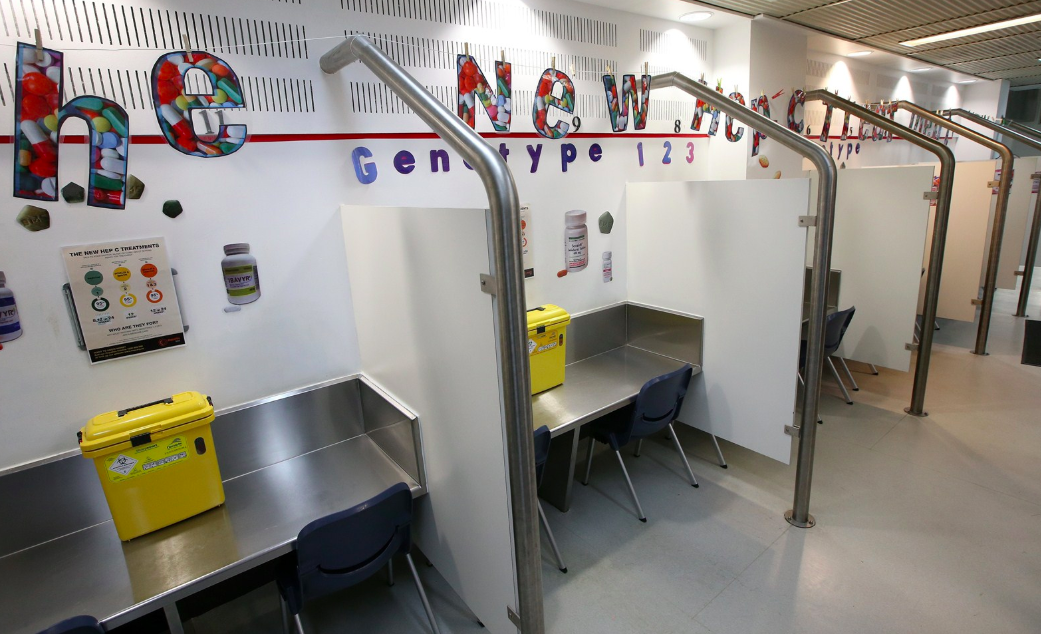We have the proof: Pill testing saves lives at music festivals

We now have evidence that pill testing saves lives.
For the second year in a row, Pill Testing Australia operated a tent at Groovin The Moo in Canberra, and it was an overwhelming success. There is now no doubt that such a service saved lives, was embraced by those who planned to take pills at the festival, and educated hundreds of people on the possible effects of the drugs they were taking. It was clean, it was clinical, it was friendly, and it worked. We have quantifiable evidence.
Let’s play numbers. 171 individual pills were tested, with seven testing positive for n-ethylpentylone, which sounds deadly and most likely would have been if these people had taken the pills. But they didn’t. They discarded them, gladly and without hesitation, and thus didn’t end up on the front pages of the dailes.
Gladys Berejiklian’s response: “They haven’t shown there is any evidence yet.”
The arguments against pill testing by the Government are tired and obvious, but not without reason. They are as follows: that drug takers are breaking the law; that allowing such tests at music festivals sanctions and normalises illegal drug-taking; that it gives would-be users a “green light” to indulge; that it represents a softened stance on drug-taking; that it emboldens drug dealers; that these drugs are never safe and so the tests are redundant and offer a false sense of security; that the law is the law is the law.
I understand these arguments from a rational point of view. But they don’t represent what’s actually going on here.
Let’s, for the moment, put aside the fact that humans have taken drugs ever since Moses, high on psychedelics, wandered up a mountain with a stone tablet, spoke to God and came back with the rules for life. Let’s forget that people will take drugs regardless of the legal consequences. Let’s put aside how drug laws allow for police profiling. Let’s, for now, ignore the numerous times throughout history that legalising certain drugs didn’t result in chaotic hedonism, just in the market forces shifting and more data being available.
Let’s instead focus on the more sinister attitude prevalent in the arguments made against pill testing at music festivals. For the sake of simplicity, let’s assume that when we talk about pills at festivals from now on, we are talking about MDMA, or ecstasy, Molly, whatever you want to call it. (Sidenote: I propose from now on referring to a baggie of pills as a ‘Gladys-bag’, as she seems to really want her cultural legacy to be tied to pill taking at festivals.) The train of thought seems to go as follows. Taking MDMA is illegal. Therefore, people who take MDMA are criminals. Therefore, if they happen to die as a result of their crime, they were fully aware of the risks, and therefore deserved to die. It is illegal, so it was their own fault. They did it to themselves. Drugs are a risk that can only be mitigated through abstinence.
An even darker truth follows: the more young people that die at these music festivals, the more this message can be hammered home. Shaking heads can tut on television and ask how anyone can be so reckless, so stupid. Such a shame. Such a waste of young vital life. Every death can be used as a warning to other would-be MDMA users, and as proof that hardline, zero-policy measures need to be adopted.
A drug death at a music festival acts not as a singular tragedy but as splashy evidence that pill testing should never be allowed. The longer pill testing is blocked, the more deaths there will be, and the more proof that pill testing should never be allowed. More cops, more laws, more arrests, more deaths. It’s circular logic, and it makes sense if you choose not to analyse it.

In 2001, Australia’s first legal medically-supervised heroin injecting room was opened in Kings Cross, to fierce opposition. Forget Gladys and the Libs, this thing was so hated that the Pope got involved, sending a letter (a tablet would have been more appropriate) to the Sisters of Mercy forbidding them to run the centre. Evidently the letter got lost in the post, and the centre opened that May, and not a day too early. In 1964, six Australians died of heroin overdoses. By 1999, there were 958. Heroin was a scourge. Kings Cross was a junkie wasteland. During the first 18 months of operation, 3,810 people used the room a combined 56,861 times. There were 329 overdoses in the centre, requiring “clinical management” but no deaths. In other words, lives were saved in a quantifiable way – much like on the weekend at Groovin The Moo.
The injecting room still sits there on Darlinghurst Road, eighteen years later. Similar centres now operate in a dozen countries around the world. They have been overwhelmingly successful. They are no longer seen as transgressive or permissive, just a science-based safety measure for a societal issue that shows no signs of going away.

Technology and necessity always provide elegant workarounds when legislation is too slow or the problem seems too large. For a non-drug-related example, LifeStraw is a drinking straw that removes waterborne bacteria and parasites as the user drinks from it. The filtration happens in the straw. They cost under $2 to make, and have been deployed in mass to the third world and in times of humanitarian crisis. They have saved countless lives, and continue to do so. It’s impossible to cleanse an entire river system, but a glass of water – that’s achievable.
On a smaller, but no less urgent scale, we now have the means to test for chemical compounds in one single pill for a similarly nominal price. Given the numerous roadblocks for pill-testing centres at festivals, Australian companies like EZ-Test have popped up offering self-testing kits to individuals, which numerous NSW pharmacies are now selling over-the-counter for around ten dollars a pop.
Such tests are legal, but soon may not be – the Drugs Use and Traffic Act states it is an offence to have any equipment “for the use and administration” of an illegal drug – a murky definition that such testing kits could easily fall under in the eyes of an overzealous officer. At the very least, possession or purchase of such kits at a festival could seem like reasonable grounds for search – if you have the kit, you have the drugs goes the logic.
Dr David Caldicott from Harm Reduction Australia appeared on Sunrise this week to speak about the successful pill testing trial at Groovin The Moo. “One thing that should be emphasised is that when they were told about the potential hazards, many were shocked,” he explained of those who offered up their pills for testing. “They hadn’t really felt that they had been educated about that before.”
This is a very important point to note.
While the tired party line seems to be that pill testing is a tacit acceptance of festival drug use, it will also act to highlight the very real fact that sometimes your pills are spiked with dangerous chemicals, and you can die from taking them. Such testing centres will provide very real statistics. The isolated death of a stranger at a music festival, even one you happen to be at, seems like an anomaly, an unforeseeable tragedy. Most people don’t use a random death to mull over their own life choices, or to take stock of their own use of drugs. It’s too abstract a thought, even if the person is your own age, at the same festival, taking the same drug. They must have been spiked, been unlucky in a way you could never be, gotten a bad pill from a bikie who mixed it with Ajax in a rusty bathtub out the back of their clubhouse. Bad things happen to others, you reason, then carry on regardless. But frequent evidence of tainted, deadly pills at multiple music festivals with science and data to back it up – that’s a real anti-drugs policy.
And if pill testing doesn’t stop people taking drugs, which — let’s be honest — it won’t, it will at least allow them to be educated about their choices in a real, quantifiable manner. And it will save lives. It already has.


































